Promoting Mental Health through Mobile Technologies
VerifiedAdded on 2023/06/11
|15
|5659
|77
AI Summary
This literature review explores the use of mobile technologies to promote mental health and treat psychiatric disorders. It covers topics such as the use of mobiles and app devices, e-health and m-health technologies, call centers and mobile apps for psychiatric disorders, and the benefits of using mobile technologies for mental health care. The review also discusses the potential of mobile technologies to transform health care delivery and support health care objectives. Course code, course name, and college/university are not mentioned.
Contribute Materials
Your contribution can guide someone’s learning journey. Share your
documents today.
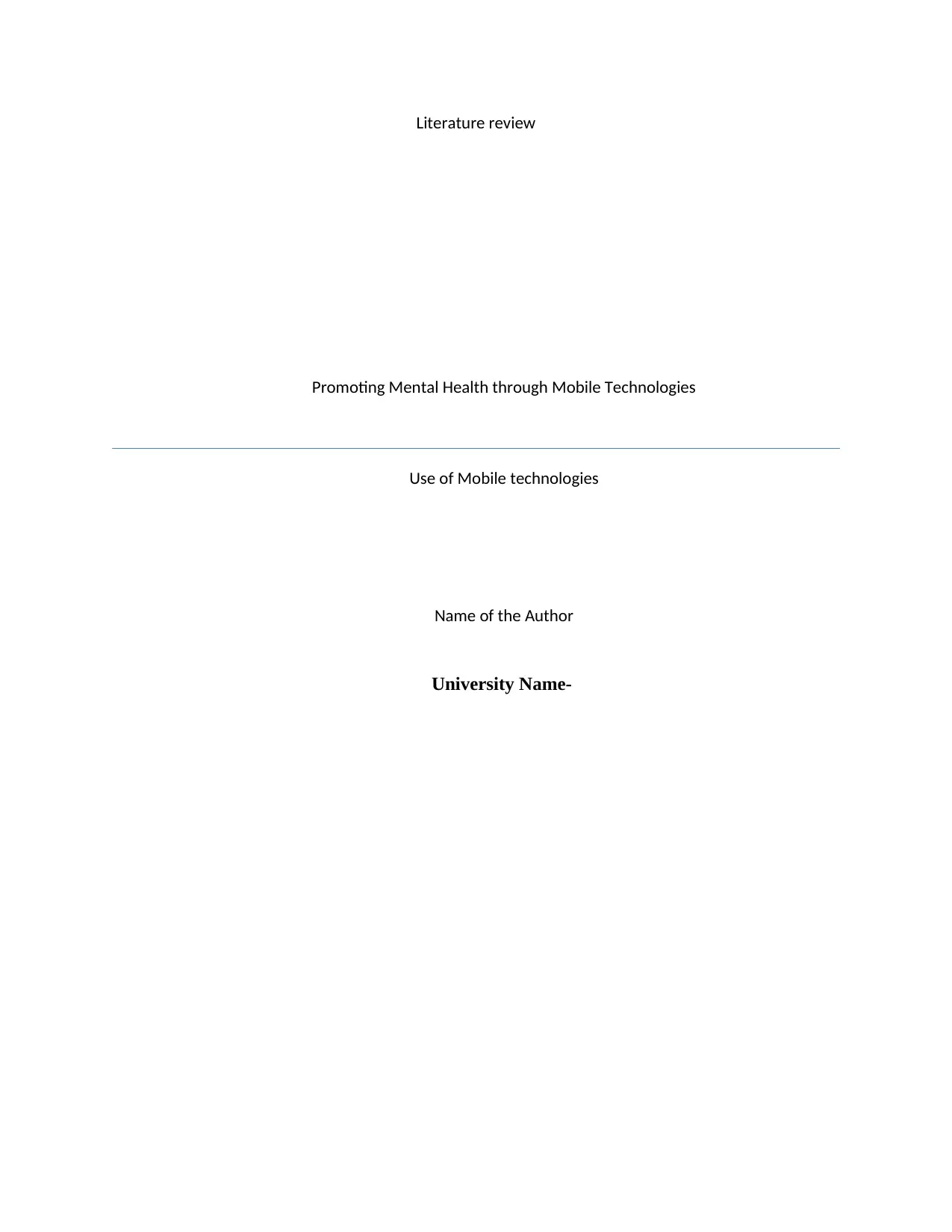
Literature review
Promoting Mental Health through Mobile Technologies
Use of Mobile technologies
Name of the Author
University Name-
Promoting Mental Health through Mobile Technologies
Use of Mobile technologies
Name of the Author
University Name-
Secure Best Marks with AI Grader
Need help grading? Try our AI Grader for instant feedback on your assignments.
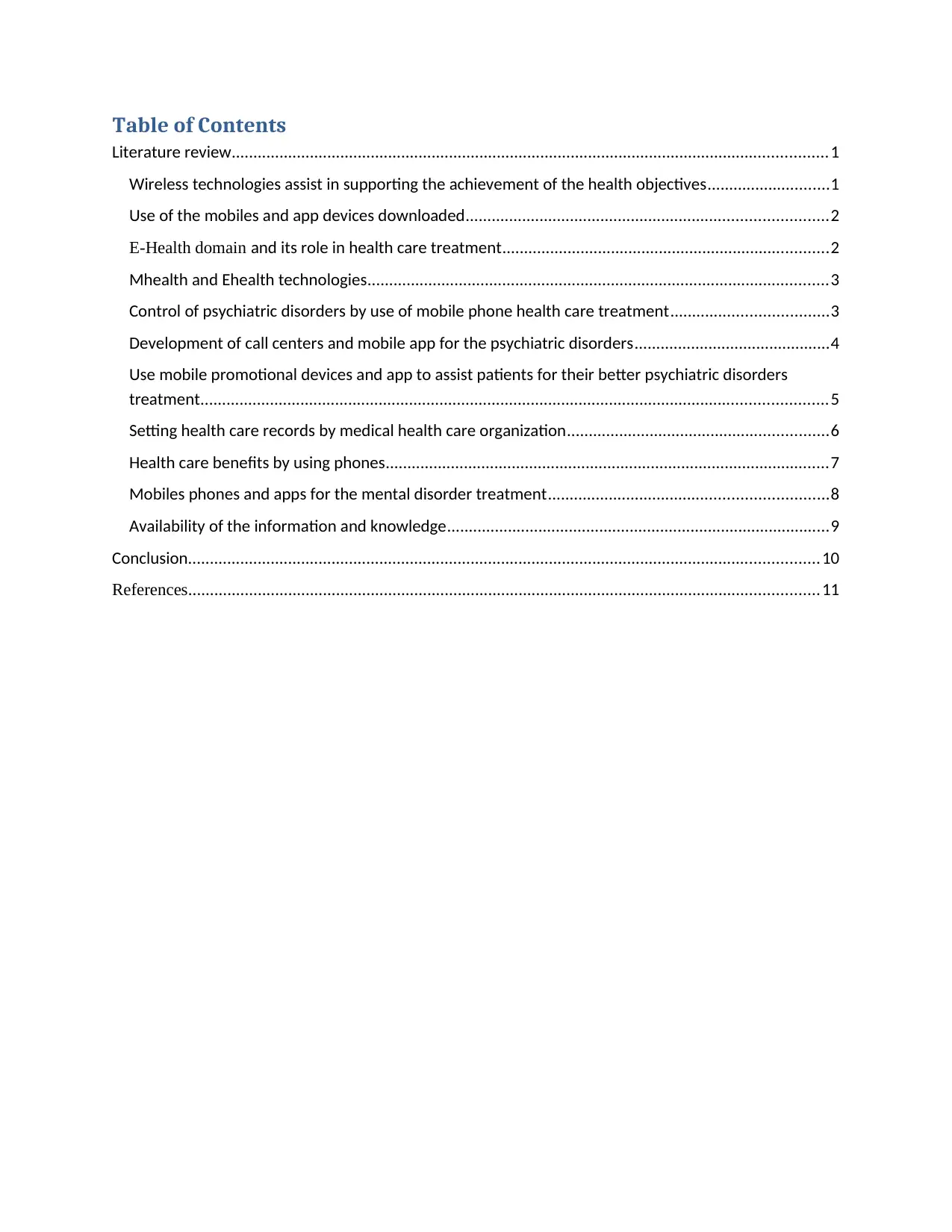
Table of Contents
Literature review.........................................................................................................................................1
Wireless technologies assist in supporting the achievement of the health objectives............................1
Use of the mobiles and app devices downloaded...................................................................................2
E-Health domain and its role in health care treatment...........................................................................2
Mhealth and Ehealth technologies..........................................................................................................3
Control of psychiatric disorders by use of mobile phone health care treatment....................................3
Development of call centers and mobile app for the psychiatric disorders.............................................4
Use mobile promotional devices and app to assist patients for their better psychiatric disorders
treatment................................................................................................................................................5
Setting health care records by medical health care organization............................................................6
Health care benefits by using phones......................................................................................................7
Mobiles phones and apps for the mental disorder treatment................................................................8
Availability of the information and knowledge........................................................................................9
Conclusion.................................................................................................................................................10
References.................................................................................................................................................11
Literature review.........................................................................................................................................1
Wireless technologies assist in supporting the achievement of the health objectives............................1
Use of the mobiles and app devices downloaded...................................................................................2
E-Health domain and its role in health care treatment...........................................................................2
Mhealth and Ehealth technologies..........................................................................................................3
Control of psychiatric disorders by use of mobile phone health care treatment....................................3
Development of call centers and mobile app for the psychiatric disorders.............................................4
Use mobile promotional devices and app to assist patients for their better psychiatric disorders
treatment................................................................................................................................................5
Setting health care records by medical health care organization............................................................6
Health care benefits by using phones......................................................................................................7
Mobiles phones and apps for the mental disorder treatment................................................................8
Availability of the information and knowledge........................................................................................9
Conclusion.................................................................................................................................................10
References.................................................................................................................................................11
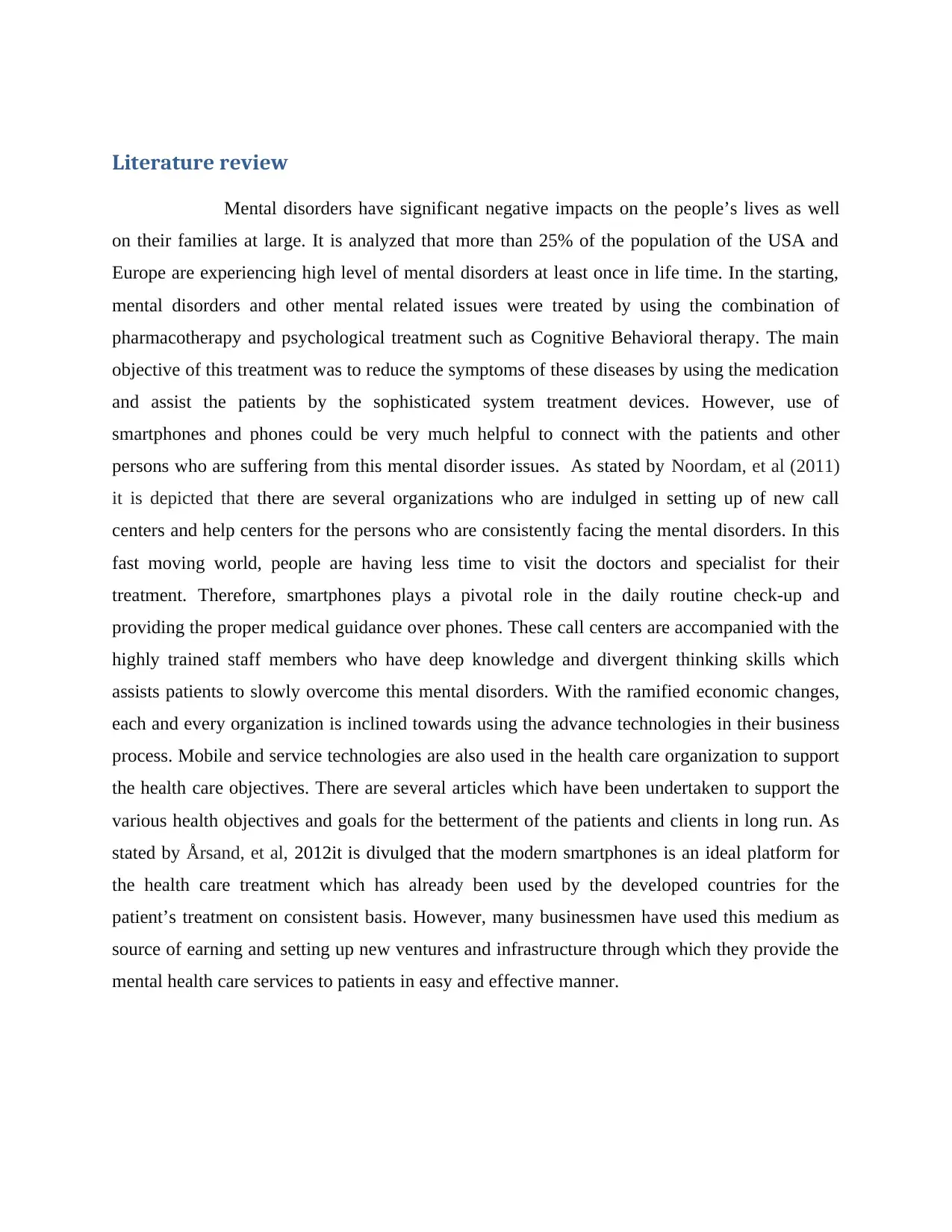
Literature review
Mental disorders have significant negative impacts on the people’s lives as well
on their families at large. It is analyzed that more than 25% of the population of the USA and
Europe are experiencing high level of mental disorders at least once in life time. In the starting,
mental disorders and other mental related issues were treated by using the combination of
pharmacotherapy and psychological treatment such as Cognitive Behavioral therapy. The main
objective of this treatment was to reduce the symptoms of these diseases by using the medication
and assist the patients by the sophisticated system treatment devices. However, use of
smartphones and phones could be very much helpful to connect with the patients and other
persons who are suffering from this mental disorder issues. As stated by Noordam, et al (2011)
it is depicted that there are several organizations who are indulged in setting up of new call
centers and help centers for the persons who are consistently facing the mental disorders. In this
fast moving world, people are having less time to visit the doctors and specialist for their
treatment. Therefore, smartphones plays a pivotal role in the daily routine check-up and
providing the proper medical guidance over phones. These call centers are accompanied with the
highly trained staff members who have deep knowledge and divergent thinking skills which
assists patients to slowly overcome this mental disorders. With the ramified economic changes,
each and every organization is inclined towards using the advance technologies in their business
process. Mobile and service technologies are also used in the health care organization to support
the health care objectives. There are several articles which have been undertaken to support the
various health objectives and goals for the betterment of the patients and clients in long run. As
stated by Årsand, et al, 2012it is divulged that the modern smartphones is an ideal platform for
the health care treatment which has already been used by the developed countries for the
patient’s treatment on consistent basis. However, many businessmen have used this medium as
source of earning and setting up new ventures and infrastructure through which they provide the
mental health care services to patients in easy and effective manner.
Mental disorders have significant negative impacts on the people’s lives as well
on their families at large. It is analyzed that more than 25% of the population of the USA and
Europe are experiencing high level of mental disorders at least once in life time. In the starting,
mental disorders and other mental related issues were treated by using the combination of
pharmacotherapy and psychological treatment such as Cognitive Behavioral therapy. The main
objective of this treatment was to reduce the symptoms of these diseases by using the medication
and assist the patients by the sophisticated system treatment devices. However, use of
smartphones and phones could be very much helpful to connect with the patients and other
persons who are suffering from this mental disorder issues. As stated by Noordam, et al (2011)
it is depicted that there are several organizations who are indulged in setting up of new call
centers and help centers for the persons who are consistently facing the mental disorders. In this
fast moving world, people are having less time to visit the doctors and specialist for their
treatment. Therefore, smartphones plays a pivotal role in the daily routine check-up and
providing the proper medical guidance over phones. These call centers are accompanied with the
highly trained staff members who have deep knowledge and divergent thinking skills which
assists patients to slowly overcome this mental disorders. With the ramified economic changes,
each and every organization is inclined towards using the advance technologies in their business
process. Mobile and service technologies are also used in the health care organization to support
the health care objectives. There are several articles which have been undertaken to support the
various health objectives and goals for the betterment of the patients and clients in long run. As
stated by Årsand, et al, 2012it is divulged that the modern smartphones is an ideal platform for
the health care treatment which has already been used by the developed countries for the
patient’s treatment on consistent basis. However, many businessmen have used this medium as
source of earning and setting up new ventures and infrastructure through which they provide the
mental health care services to patients in easy and effective manner.
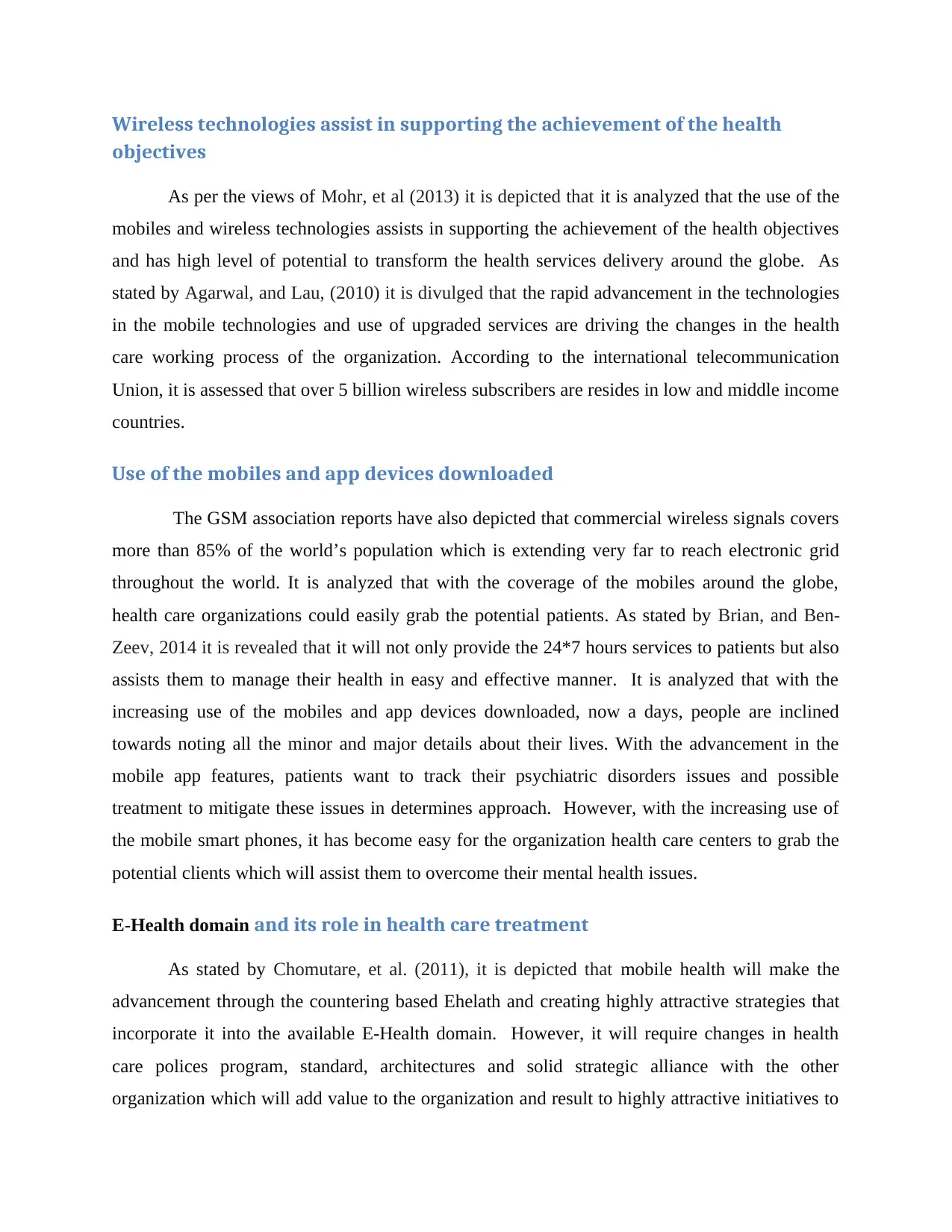
Wireless technologies assist in supporting the achievement of the health
objectives
As per the views of Mohr, et al (2013) it is depicted that it is analyzed that the use of the
mobiles and wireless technologies assists in supporting the achievement of the health objectives
and has high level of potential to transform the health services delivery around the globe. As
stated by Agarwal, and Lau, (2010) it is divulged that the rapid advancement in the technologies
in the mobile technologies and use of upgraded services are driving the changes in the health
care working process of the organization. According to the international telecommunication
Union, it is assessed that over 5 billion wireless subscribers are resides in low and middle income
countries.
Use of the mobiles and app devices downloaded
The GSM association reports have also depicted that commercial wireless signals covers
more than 85% of the world’s population which is extending very far to reach electronic grid
throughout the world. It is analyzed that with the coverage of the mobiles around the globe,
health care organizations could easily grab the potential patients. As stated by Brian, and Ben-
Zeev, 2014 it is revealed that it will not only provide the 24*7 hours services to patients but also
assists them to manage their health in easy and effective manner. It is analyzed that with the
increasing use of the mobiles and app devices downloaded, now a days, people are inclined
towards noting all the minor and major details about their lives. With the advancement in the
mobile app features, patients want to track their psychiatric disorders issues and possible
treatment to mitigate these issues in determines approach. However, with the increasing use of
the mobile smart phones, it has become easy for the organization health care centers to grab the
potential clients which will assist them to overcome their mental health issues.
E-Health domain and its role in health care treatment
As stated by Chomutare, et al. (2011), it is depicted that mobile health will make the
advancement through the countering based Ehelath and creating highly attractive strategies that
incorporate it into the available E-Health domain. However, it will require changes in health
care polices program, standard, architectures and solid strategic alliance with the other
organization which will add value to the organization and result to highly attractive initiatives to
objectives
As per the views of Mohr, et al (2013) it is depicted that it is analyzed that the use of the
mobiles and wireless technologies assists in supporting the achievement of the health objectives
and has high level of potential to transform the health services delivery around the globe. As
stated by Agarwal, and Lau, (2010) it is divulged that the rapid advancement in the technologies
in the mobile technologies and use of upgraded services are driving the changes in the health
care working process of the organization. According to the international telecommunication
Union, it is assessed that over 5 billion wireless subscribers are resides in low and middle income
countries.
Use of the mobiles and app devices downloaded
The GSM association reports have also depicted that commercial wireless signals covers
more than 85% of the world’s population which is extending very far to reach electronic grid
throughout the world. It is analyzed that with the coverage of the mobiles around the globe,
health care organizations could easily grab the potential patients. As stated by Brian, and Ben-
Zeev, 2014 it is revealed that it will not only provide the 24*7 hours services to patients but also
assists them to manage their health in easy and effective manner. It is analyzed that with the
increasing use of the mobiles and app devices downloaded, now a days, people are inclined
towards noting all the minor and major details about their lives. With the advancement in the
mobile app features, patients want to track their psychiatric disorders issues and possible
treatment to mitigate these issues in determines approach. However, with the increasing use of
the mobile smart phones, it has become easy for the organization health care centers to grab the
potential clients which will assist them to overcome their mental health issues.
E-Health domain and its role in health care treatment
As stated by Chomutare, et al. (2011), it is depicted that mobile health will make the
advancement through the countering based Ehelath and creating highly attractive strategies that
incorporate it into the available E-Health domain. However, it will require changes in health
care polices program, standard, architectures and solid strategic alliance with the other
organization which will add value to the organization and result to highly attractive initiatives to
Secure Best Marks with AI Grader
Need help grading? Try our AI Grader for instant feedback on your assignments.
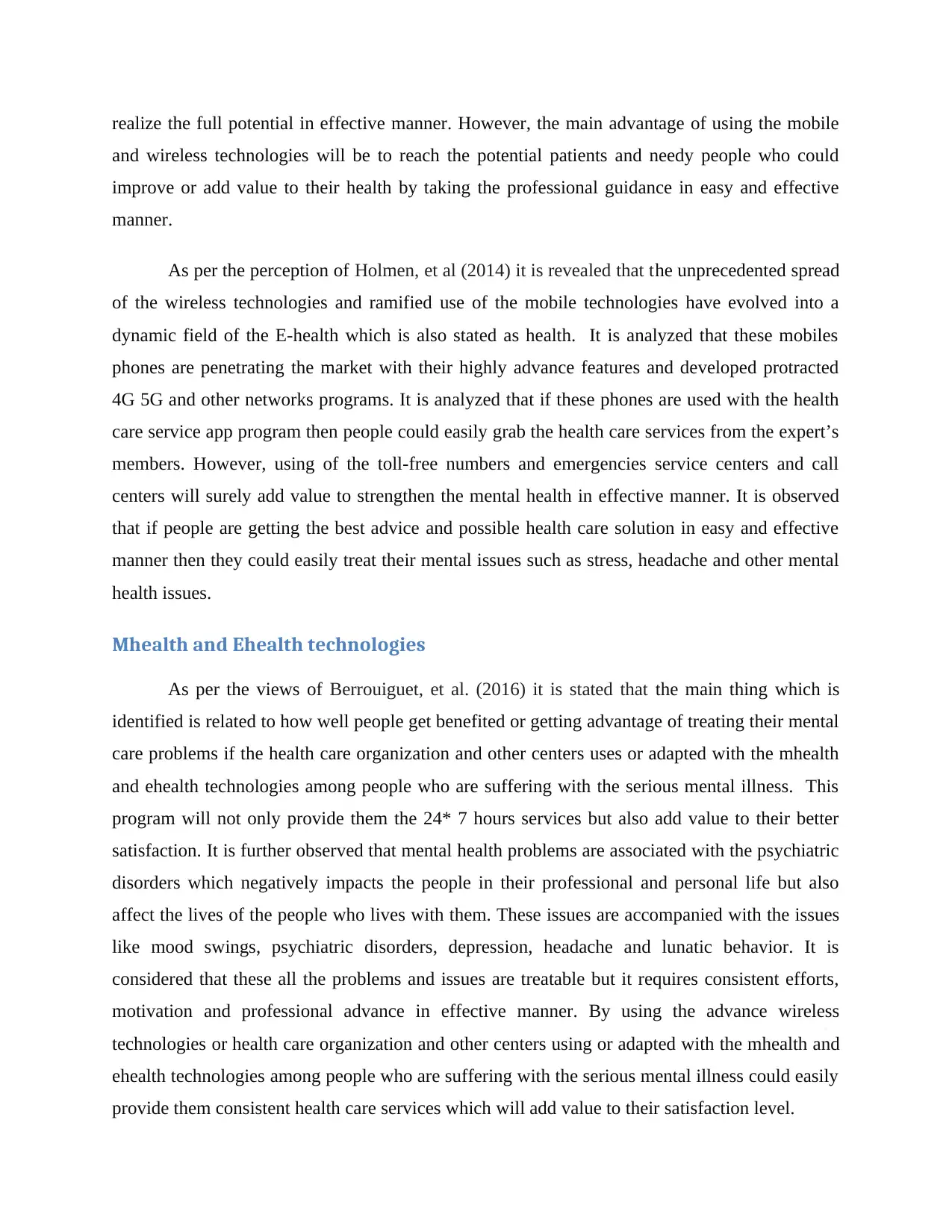
realize the full potential in effective manner. However, the main advantage of using the mobile
and wireless technologies will be to reach the potential patients and needy people who could
improve or add value to their health by taking the professional guidance in easy and effective
manner.
As per the perception of Holmen, et al (2014) it is revealed that the unprecedented spread
of the wireless technologies and ramified use of the mobile technologies have evolved into a
dynamic field of the E-health which is also stated as health. It is analyzed that these mobiles
phones are penetrating the market with their highly advance features and developed protracted
4G 5G and other networks programs. It is analyzed that if these phones are used with the health
care service app program then people could easily grab the health care services from the expert’s
members. However, using of the toll-free numbers and emergencies service centers and call
centers will surely add value to strengthen the mental health in effective manner. It is observed
that if people are getting the best advice and possible health care solution in easy and effective
manner then they could easily treat their mental issues such as stress, headache and other mental
health issues.
Mhealth and Ehealth technologies
As per the views of Berrouiguet, et al. (2016) it is stated that the main thing which is
identified is related to how well people get benefited or getting advantage of treating their mental
care problems if the health care organization and other centers uses or adapted with the mhealth
and ehealth technologies among people who are suffering with the serious mental illness. This
program will not only provide them the 24* 7 hours services but also add value to their better
satisfaction. It is further observed that mental health problems are associated with the psychiatric
disorders which negatively impacts the people in their professional and personal life but also
affect the lives of the people who lives with them. These issues are accompanied with the issues
like mood swings, psychiatric disorders, depression, headache and lunatic behavior. It is
considered that these all the problems and issues are treatable but it requires consistent efforts,
motivation and professional advance in effective manner. By using the advance wireless
technologies or health care organization and other centers using or adapted with the mhealth and
ehealth technologies among people who are suffering with the serious mental illness could easily
provide them consistent health care services which will add value to their satisfaction level.
and wireless technologies will be to reach the potential patients and needy people who could
improve or add value to their health by taking the professional guidance in easy and effective
manner.
As per the perception of Holmen, et al (2014) it is revealed that the unprecedented spread
of the wireless technologies and ramified use of the mobile technologies have evolved into a
dynamic field of the E-health which is also stated as health. It is analyzed that these mobiles
phones are penetrating the market with their highly advance features and developed protracted
4G 5G and other networks programs. It is analyzed that if these phones are used with the health
care service app program then people could easily grab the health care services from the expert’s
members. However, using of the toll-free numbers and emergencies service centers and call
centers will surely add value to strengthen the mental health in effective manner. It is observed
that if people are getting the best advice and possible health care solution in easy and effective
manner then they could easily treat their mental issues such as stress, headache and other mental
health issues.
Mhealth and Ehealth technologies
As per the views of Berrouiguet, et al. (2016) it is stated that the main thing which is
identified is related to how well people get benefited or getting advantage of treating their mental
care problems if the health care organization and other centers uses or adapted with the mhealth
and ehealth technologies among people who are suffering with the serious mental illness. This
program will not only provide them the 24* 7 hours services but also add value to their better
satisfaction. It is further observed that mental health problems are associated with the psychiatric
disorders which negatively impacts the people in their professional and personal life but also
affect the lives of the people who lives with them. These issues are accompanied with the issues
like mood swings, psychiatric disorders, depression, headache and lunatic behavior. It is
considered that these all the problems and issues are treatable but it requires consistent efforts,
motivation and professional advance in effective manner. By using the advance wireless
technologies or health care organization and other centers using or adapted with the mhealth and
ehealth technologies among people who are suffering with the serious mental illness could easily
provide them consistent health care services which will add value to their satisfaction level.
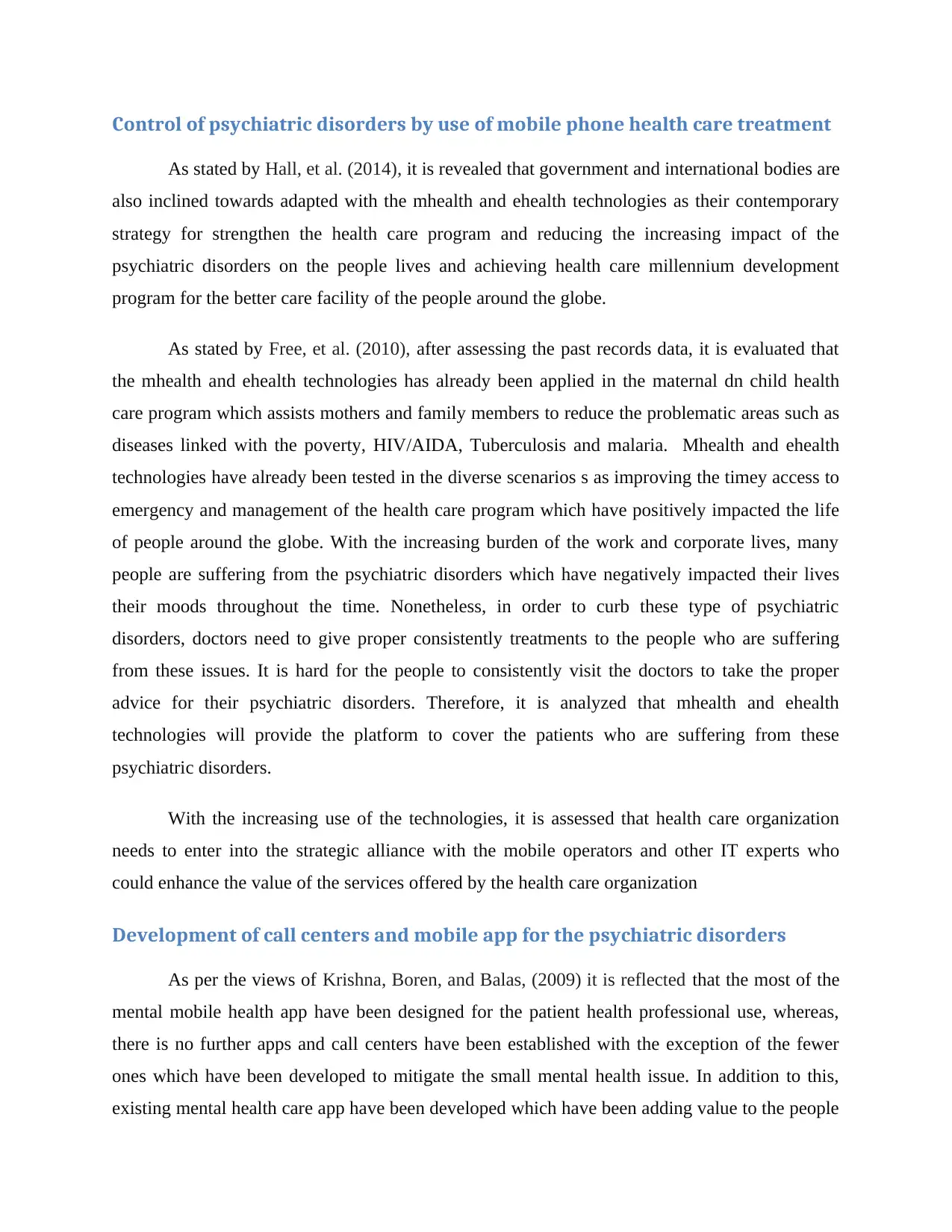
Control of psychiatric disorders by use of mobile phone health care treatment
As stated by Hall, et al. (2014), it is revealed that government and international bodies are
also inclined towards adapted with the mhealth and ehealth technologies as their contemporary
strategy for strengthen the health care program and reducing the increasing impact of the
psychiatric disorders on the people lives and achieving health care millennium development
program for the better care facility of the people around the globe.
As stated by Free, et al. (2010), after assessing the past records data, it is evaluated that
the mhealth and ehealth technologies has already been applied in the maternal dn child health
care program which assists mothers and family members to reduce the problematic areas such as
diseases linked with the poverty, HIV/AIDA, Tuberculosis and malaria. Mhealth and ehealth
technologies have already been tested in the diverse scenarios s as improving the timey access to
emergency and management of the health care program which have positively impacted the life
of people around the globe. With the increasing burden of the work and corporate lives, many
people are suffering from the psychiatric disorders which have negatively impacted their lives
their moods throughout the time. Nonetheless, in order to curb these type of psychiatric
disorders, doctors need to give proper consistently treatments to the people who are suffering
from these issues. It is hard for the people to consistently visit the doctors to take the proper
advice for their psychiatric disorders. Therefore, it is analyzed that mhealth and ehealth
technologies will provide the platform to cover the patients who are suffering from these
psychiatric disorders.
With the increasing use of the technologies, it is assessed that health care organization
needs to enter into the strategic alliance with the mobile operators and other IT experts who
could enhance the value of the services offered by the health care organization
Development of call centers and mobile app for the psychiatric disorders
As per the views of Krishna, Boren, and Balas, (2009) it is reflected that the most of the
mental mobile health app have been designed for the patient health professional use, whereas,
there is no further apps and call centers have been established with the exception of the fewer
ones which have been developed to mitigate the small mental health issue. In addition to this,
existing mental health care app have been developed which have been adding value to the people
As stated by Hall, et al. (2014), it is revealed that government and international bodies are
also inclined towards adapted with the mhealth and ehealth technologies as their contemporary
strategy for strengthen the health care program and reducing the increasing impact of the
psychiatric disorders on the people lives and achieving health care millennium development
program for the better care facility of the people around the globe.
As stated by Free, et al. (2010), after assessing the past records data, it is evaluated that
the mhealth and ehealth technologies has already been applied in the maternal dn child health
care program which assists mothers and family members to reduce the problematic areas such as
diseases linked with the poverty, HIV/AIDA, Tuberculosis and malaria. Mhealth and ehealth
technologies have already been tested in the diverse scenarios s as improving the timey access to
emergency and management of the health care program which have positively impacted the life
of people around the globe. With the increasing burden of the work and corporate lives, many
people are suffering from the psychiatric disorders which have negatively impacted their lives
their moods throughout the time. Nonetheless, in order to curb these type of psychiatric
disorders, doctors need to give proper consistently treatments to the people who are suffering
from these issues. It is hard for the people to consistently visit the doctors to take the proper
advice for their psychiatric disorders. Therefore, it is analyzed that mhealth and ehealth
technologies will provide the platform to cover the patients who are suffering from these
psychiatric disorders.
With the increasing use of the technologies, it is assessed that health care organization
needs to enter into the strategic alliance with the mobile operators and other IT experts who
could enhance the value of the services offered by the health care organization
Development of call centers and mobile app for the psychiatric disorders
As per the views of Krishna, Boren, and Balas, (2009) it is reflected that the most of the
mental mobile health app have been designed for the patient health professional use, whereas,
there is no further apps and call centers have been established with the exception of the fewer
ones which have been developed to mitigate the small mental health issue. In addition to this,
existing mental health care app have been developed which have been adding value to the people
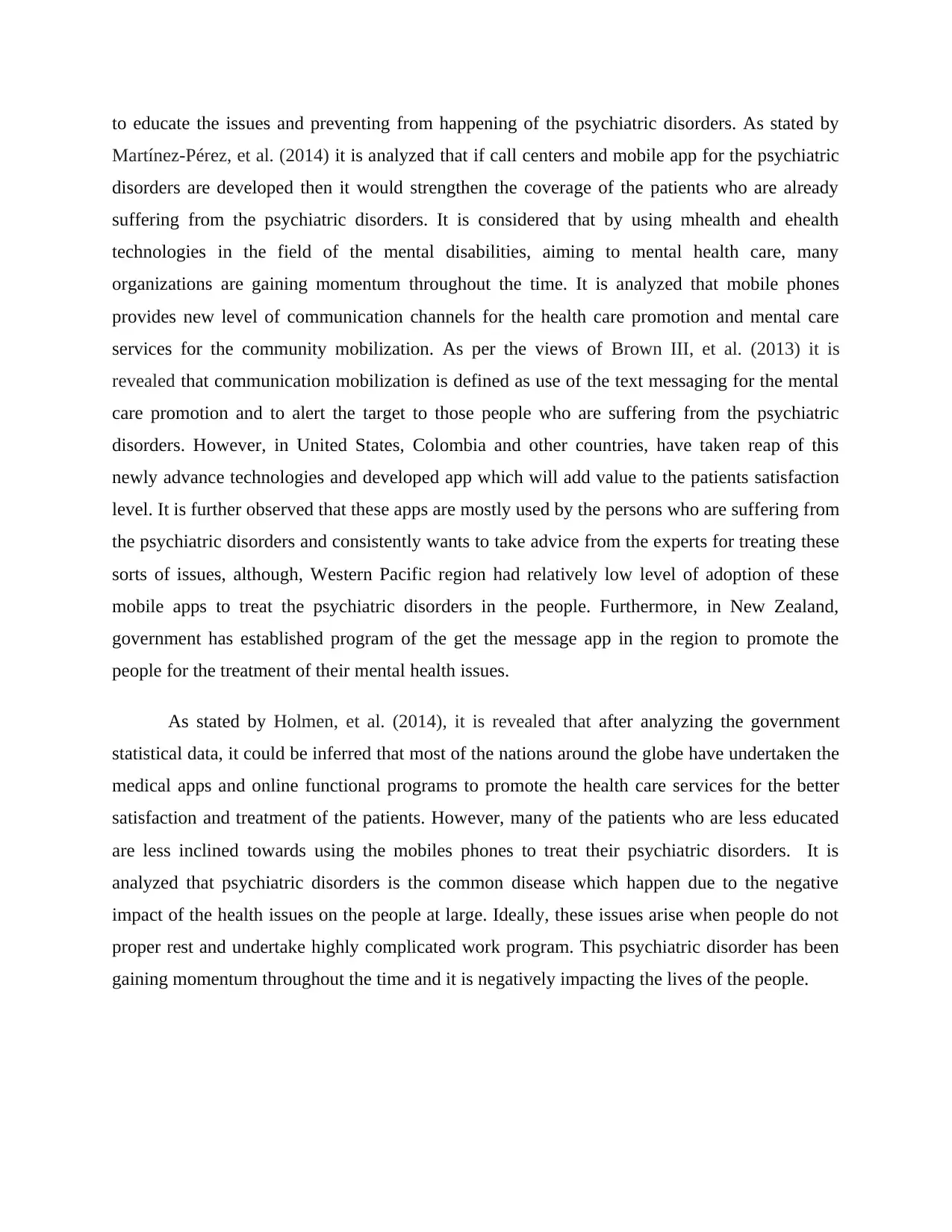
to educate the issues and preventing from happening of the psychiatric disorders. As stated by
Martínez-Pérez, et al. (2014) it is analyzed that if call centers and mobile app for the psychiatric
disorders are developed then it would strengthen the coverage of the patients who are already
suffering from the psychiatric disorders. It is considered that by using mhealth and ehealth
technologies in the field of the mental disabilities, aiming to mental health care, many
organizations are gaining momentum throughout the time. It is analyzed that mobile phones
provides new level of communication channels for the health care promotion and mental care
services for the community mobilization. As per the views of Brown III, et al. (2013) it is
revealed that communication mobilization is defined as use of the text messaging for the mental
care promotion and to alert the target to those people who are suffering from the psychiatric
disorders. However, in United States, Colombia and other countries, have taken reap of this
newly advance technologies and developed app which will add value to the patients satisfaction
level. It is further observed that these apps are mostly used by the persons who are suffering from
the psychiatric disorders and consistently wants to take advice from the experts for treating these
sorts of issues, although, Western Pacific region had relatively low level of adoption of these
mobile apps to treat the psychiatric disorders in the people. Furthermore, in New Zealand,
government has established program of the get the message app in the region to promote the
people for the treatment of their mental health issues.
As stated by Holmen, et al. (2014), it is revealed that after analyzing the government
statistical data, it could be inferred that most of the nations around the globe have undertaken the
medical apps and online functional programs to promote the health care services for the better
satisfaction and treatment of the patients. However, many of the patients who are less educated
are less inclined towards using the mobiles phones to treat their psychiatric disorders. It is
analyzed that psychiatric disorders is the common disease which happen due to the negative
impact of the health issues on the people at large. Ideally, these issues arise when people do not
proper rest and undertake highly complicated work program. This psychiatric disorder has been
gaining momentum throughout the time and it is negatively impacting the lives of the people.
Martínez-Pérez, et al. (2014) it is analyzed that if call centers and mobile app for the psychiatric
disorders are developed then it would strengthen the coverage of the patients who are already
suffering from the psychiatric disorders. It is considered that by using mhealth and ehealth
technologies in the field of the mental disabilities, aiming to mental health care, many
organizations are gaining momentum throughout the time. It is analyzed that mobile phones
provides new level of communication channels for the health care promotion and mental care
services for the community mobilization. As per the views of Brown III, et al. (2013) it is
revealed that communication mobilization is defined as use of the text messaging for the mental
care promotion and to alert the target to those people who are suffering from the psychiatric
disorders. However, in United States, Colombia and other countries, have taken reap of this
newly advance technologies and developed app which will add value to the patients satisfaction
level. It is further observed that these apps are mostly used by the persons who are suffering from
the psychiatric disorders and consistently wants to take advice from the experts for treating these
sorts of issues, although, Western Pacific region had relatively low level of adoption of these
mobile apps to treat the psychiatric disorders in the people. Furthermore, in New Zealand,
government has established program of the get the message app in the region to promote the
people for the treatment of their mental health issues.
As stated by Holmen, et al. (2014), it is revealed that after analyzing the government
statistical data, it could be inferred that most of the nations around the globe have undertaken the
medical apps and online functional programs to promote the health care services for the better
satisfaction and treatment of the patients. However, many of the patients who are less educated
are less inclined towards using the mobiles phones to treat their psychiatric disorders. It is
analyzed that psychiatric disorders is the common disease which happen due to the negative
impact of the health issues on the people at large. Ideally, these issues arise when people do not
proper rest and undertake highly complicated work program. This psychiatric disorder has been
gaining momentum throughout the time and it is negatively impacting the lives of the people.
Paraphrase This Document
Need a fresh take? Get an instant paraphrase of this document with our AI Paraphraser
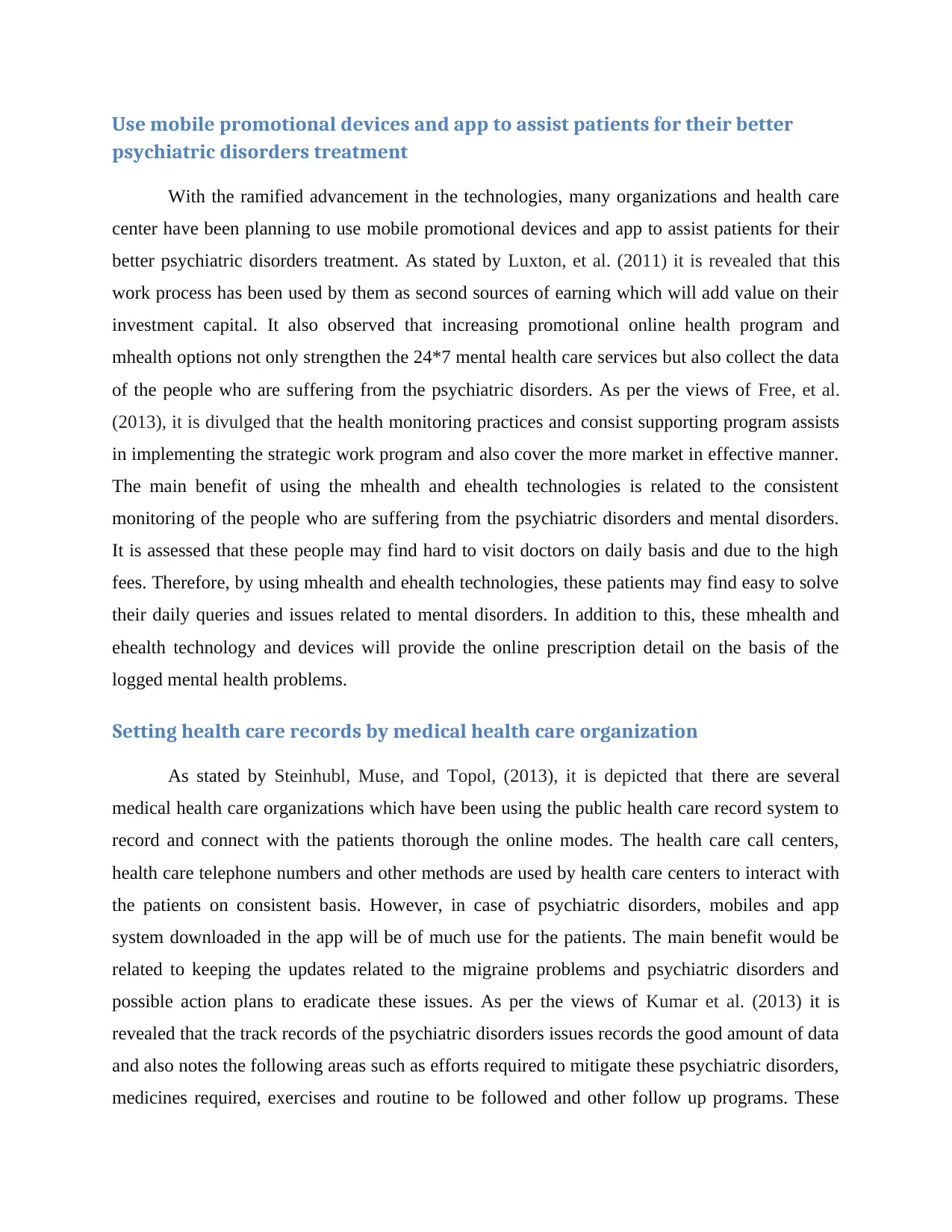
Use mobile promotional devices and app to assist patients for their better
psychiatric disorders treatment
With the ramified advancement in the technologies, many organizations and health care
center have been planning to use mobile promotional devices and app to assist patients for their
better psychiatric disorders treatment. As stated by Luxton, et al. (2011) it is revealed that this
work process has been used by them as second sources of earning which will add value on their
investment capital. It also observed that increasing promotional online health program and
mhealth options not only strengthen the 24*7 mental health care services but also collect the data
of the people who are suffering from the psychiatric disorders. As per the views of Free, et al.
(2013), it is divulged that the health monitoring practices and consist supporting program assists
in implementing the strategic work program and also cover the more market in effective manner.
The main benefit of using the mhealth and ehealth technologies is related to the consistent
monitoring of the people who are suffering from the psychiatric disorders and mental disorders.
It is assessed that these people may find hard to visit doctors on daily basis and due to the high
fees. Therefore, by using mhealth and ehealth technologies, these patients may find easy to solve
their daily queries and issues related to mental disorders. In addition to this, these mhealth and
ehealth technology and devices will provide the online prescription detail on the basis of the
logged mental health problems.
Setting health care records by medical health care organization
As stated by Steinhubl, Muse, and Topol, (2013), it is depicted that there are several
medical health care organizations which have been using the public health care record system to
record and connect with the patients thorough the online modes. The health care call centers,
health care telephone numbers and other methods are used by health care centers to interact with
the patients on consistent basis. However, in case of psychiatric disorders, mobiles and app
system downloaded in the app will be of much use for the patients. The main benefit would be
related to keeping the updates related to the migraine problems and psychiatric disorders and
possible action plans to eradicate these issues. As per the views of Kumar et al. (2013) it is
revealed that the track records of the psychiatric disorders issues records the good amount of data
and also notes the following areas such as efforts required to mitigate these psychiatric disorders,
medicines required, exercises and routine to be followed and other follow up programs. These
psychiatric disorders treatment
With the ramified advancement in the technologies, many organizations and health care
center have been planning to use mobile promotional devices and app to assist patients for their
better psychiatric disorders treatment. As stated by Luxton, et al. (2011) it is revealed that this
work process has been used by them as second sources of earning which will add value on their
investment capital. It also observed that increasing promotional online health program and
mhealth options not only strengthen the 24*7 mental health care services but also collect the data
of the people who are suffering from the psychiatric disorders. As per the views of Free, et al.
(2013), it is divulged that the health monitoring practices and consist supporting program assists
in implementing the strategic work program and also cover the more market in effective manner.
The main benefit of using the mhealth and ehealth technologies is related to the consistent
monitoring of the people who are suffering from the psychiatric disorders and mental disorders.
It is assessed that these people may find hard to visit doctors on daily basis and due to the high
fees. Therefore, by using mhealth and ehealth technologies, these patients may find easy to solve
their daily queries and issues related to mental disorders. In addition to this, these mhealth and
ehealth technology and devices will provide the online prescription detail on the basis of the
logged mental health problems.
Setting health care records by medical health care organization
As stated by Steinhubl, Muse, and Topol, (2013), it is depicted that there are several
medical health care organizations which have been using the public health care record system to
record and connect with the patients thorough the online modes. The health care call centers,
health care telephone numbers and other methods are used by health care centers to interact with
the patients on consistent basis. However, in case of psychiatric disorders, mobiles and app
system downloaded in the app will be of much use for the patients. The main benefit would be
related to keeping the updates related to the migraine problems and psychiatric disorders and
possible action plans to eradicate these issues. As per the views of Kumar et al. (2013) it is
revealed that the track records of the psychiatric disorders issues records the good amount of data
and also notes the following areas such as efforts required to mitigate these psychiatric disorders,
medicines required, exercises and routine to be followed and other follow up programs. These
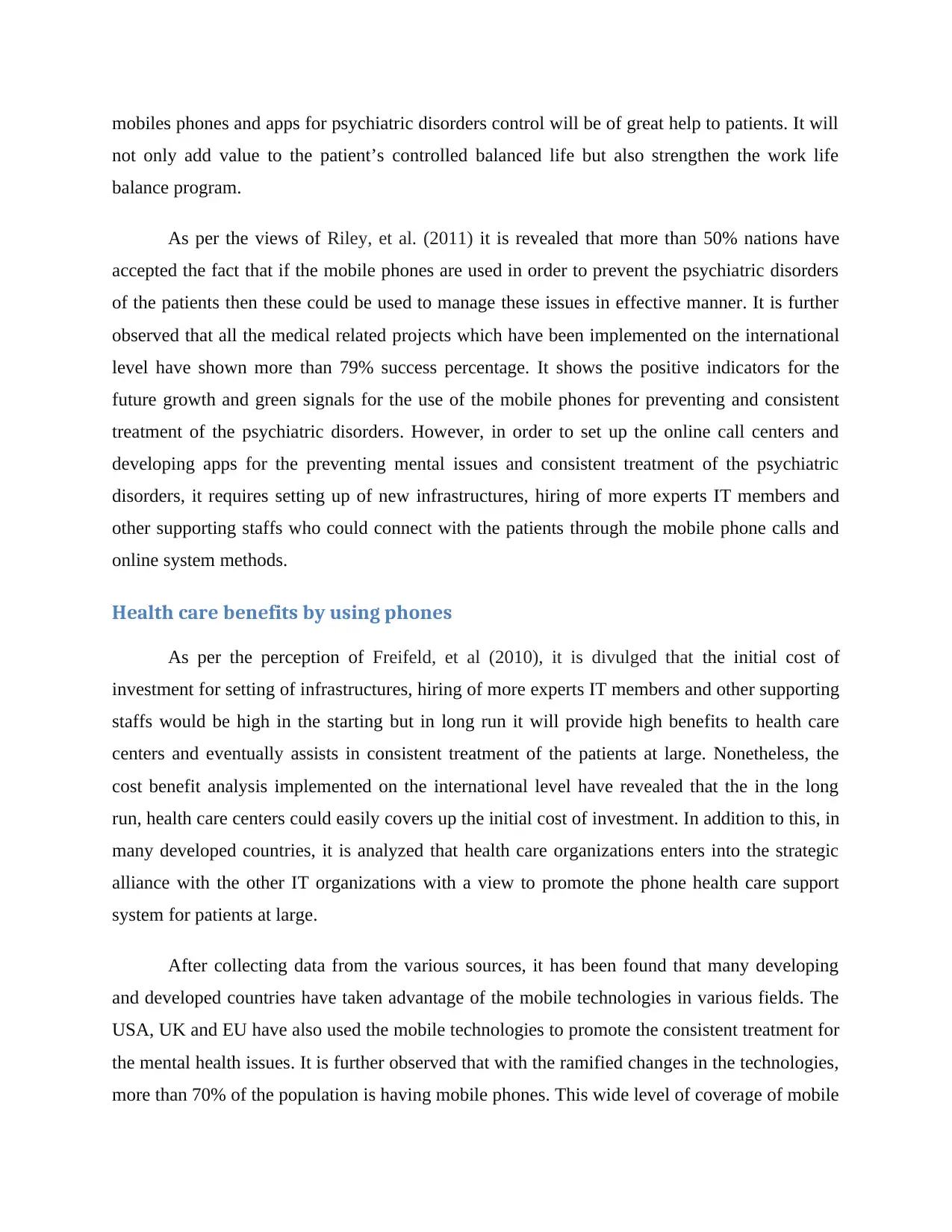
mobiles phones and apps for psychiatric disorders control will be of great help to patients. It will
not only add value to the patient’s controlled balanced life but also strengthen the work life
balance program.
As per the views of Riley, et al. (2011) it is revealed that more than 50% nations have
accepted the fact that if the mobile phones are used in order to prevent the psychiatric disorders
of the patients then these could be used to manage these issues in effective manner. It is further
observed that all the medical related projects which have been implemented on the international
level have shown more than 79% success percentage. It shows the positive indicators for the
future growth and green signals for the use of the mobile phones for preventing and consistent
treatment of the psychiatric disorders. However, in order to set up the online call centers and
developing apps for the preventing mental issues and consistent treatment of the psychiatric
disorders, it requires setting up of new infrastructures, hiring of more experts IT members and
other supporting staffs who could connect with the patients through the mobile phone calls and
online system methods.
Health care benefits by using phones
As per the perception of Freifeld, et al (2010), it is divulged that the initial cost of
investment for setting of infrastructures, hiring of more experts IT members and other supporting
staffs would be high in the starting but in long run it will provide high benefits to health care
centers and eventually assists in consistent treatment of the patients at large. Nonetheless, the
cost benefit analysis implemented on the international level have revealed that the in the long
run, health care centers could easily covers up the initial cost of investment. In addition to this, in
many developed countries, it is analyzed that health care organizations enters into the strategic
alliance with the other IT organizations with a view to promote the phone health care support
system for patients at large.
After collecting data from the various sources, it has been found that many developing
and developed countries have taken advantage of the mobile technologies in various fields. The
USA, UK and EU have also used the mobile technologies to promote the consistent treatment for
the mental health issues. It is further observed that with the ramified changes in the technologies,
more than 70% of the population is having mobile phones. This wide level of coverage of mobile
not only add value to the patient’s controlled balanced life but also strengthen the work life
balance program.
As per the views of Riley, et al. (2011) it is revealed that more than 50% nations have
accepted the fact that if the mobile phones are used in order to prevent the psychiatric disorders
of the patients then these could be used to manage these issues in effective manner. It is further
observed that all the medical related projects which have been implemented on the international
level have shown more than 79% success percentage. It shows the positive indicators for the
future growth and green signals for the use of the mobile phones for preventing and consistent
treatment of the psychiatric disorders. However, in order to set up the online call centers and
developing apps for the preventing mental issues and consistent treatment of the psychiatric
disorders, it requires setting up of new infrastructures, hiring of more experts IT members and
other supporting staffs who could connect with the patients through the mobile phone calls and
online system methods.
Health care benefits by using phones
As per the perception of Freifeld, et al (2010), it is divulged that the initial cost of
investment for setting of infrastructures, hiring of more experts IT members and other supporting
staffs would be high in the starting but in long run it will provide high benefits to health care
centers and eventually assists in consistent treatment of the patients at large. Nonetheless, the
cost benefit analysis implemented on the international level have revealed that the in the long
run, health care centers could easily covers up the initial cost of investment. In addition to this, in
many developed countries, it is analyzed that health care organizations enters into the strategic
alliance with the other IT organizations with a view to promote the phone health care support
system for patients at large.
After collecting data from the various sources, it has been found that many developing
and developed countries have taken advantage of the mobile technologies in various fields. The
USA, UK and EU have also used the mobile technologies to promote the consistent treatment for
the mental health issues. It is further observed that with the ramified changes in the technologies,
more than 70% of the population is having mobile phones. This wide level of coverage of mobile
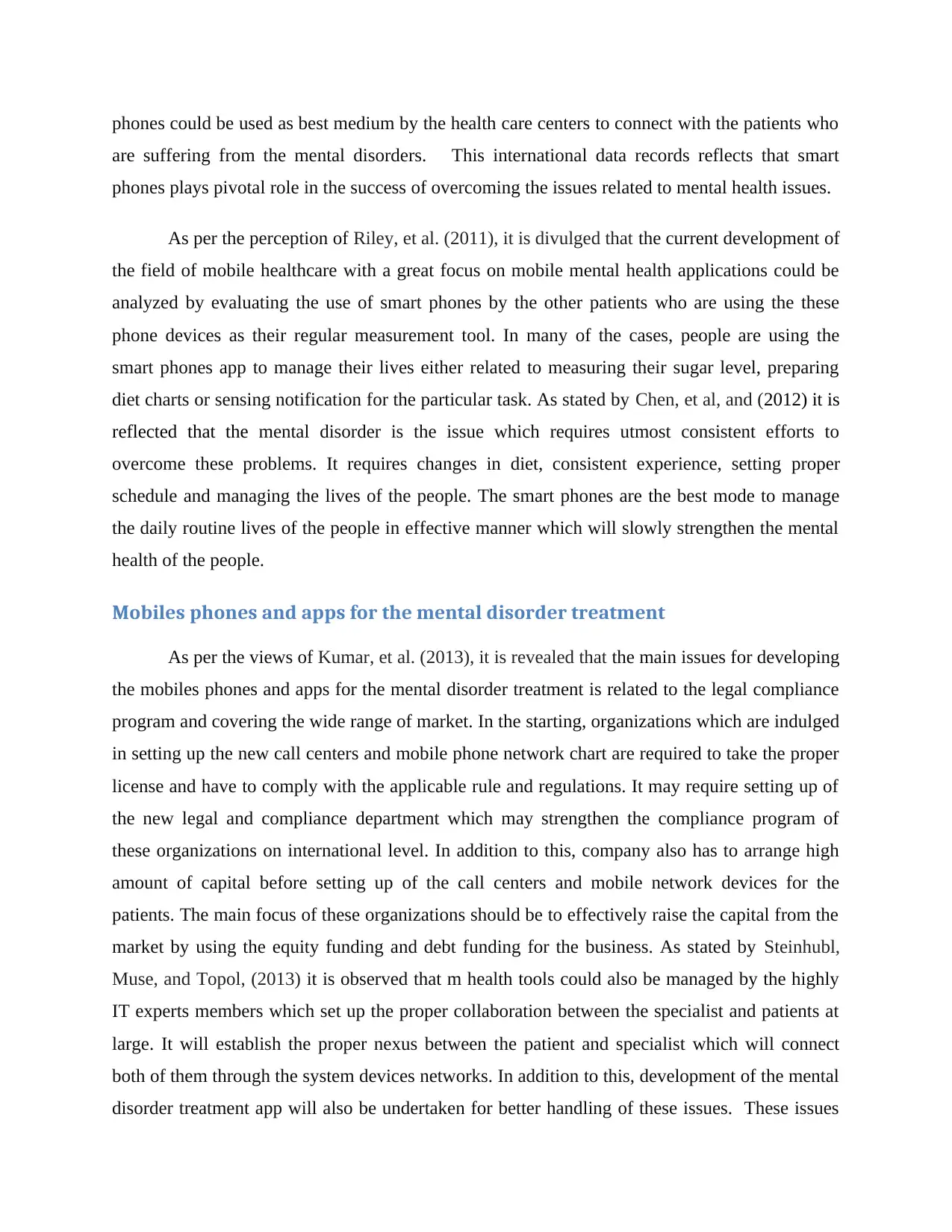
phones could be used as best medium by the health care centers to connect with the patients who
are suffering from the mental disorders. This international data records reflects that smart
phones plays pivotal role in the success of overcoming the issues related to mental health issues.
As per the perception of Riley, et al. (2011), it is divulged that the current development of
the field of mobile healthcare with a great focus on mobile mental health applications could be
analyzed by evaluating the use of smart phones by the other patients who are using the these
phone devices as their regular measurement tool. In many of the cases, people are using the
smart phones app to manage their lives either related to measuring their sugar level, preparing
diet charts or sensing notification for the particular task. As stated by Chen, et al, and (2012) it is
reflected that the mental disorder is the issue which requires utmost consistent efforts to
overcome these problems. It requires changes in diet, consistent experience, setting proper
schedule and managing the lives of the people. The smart phones are the best mode to manage
the daily routine lives of the people in effective manner which will slowly strengthen the mental
health of the people.
Mobiles phones and apps for the mental disorder treatment
As per the views of Kumar, et al. (2013), it is revealed that the main issues for developing
the mobiles phones and apps for the mental disorder treatment is related to the legal compliance
program and covering the wide range of market. In the starting, organizations which are indulged
in setting up the new call centers and mobile phone network chart are required to take the proper
license and have to comply with the applicable rule and regulations. It may require setting up of
the new legal and compliance department which may strengthen the compliance program of
these organizations on international level. In addition to this, company also has to arrange high
amount of capital before setting up of the call centers and mobile network devices for the
patients. The main focus of these organizations should be to effectively raise the capital from the
market by using the equity funding and debt funding for the business. As stated by Steinhubl,
Muse, and Topol, (2013) it is observed that m health tools could also be managed by the highly
IT experts members which set up the proper collaboration between the specialist and patients at
large. It will establish the proper nexus between the patient and specialist which will connect
both of them through the system devices networks. In addition to this, development of the mental
disorder treatment app will also be undertaken for better handling of these issues. These issues
are suffering from the mental disorders. This international data records reflects that smart
phones plays pivotal role in the success of overcoming the issues related to mental health issues.
As per the perception of Riley, et al. (2011), it is divulged that the current development of
the field of mobile healthcare with a great focus on mobile mental health applications could be
analyzed by evaluating the use of smart phones by the other patients who are using the these
phone devices as their regular measurement tool. In many of the cases, people are using the
smart phones app to manage their lives either related to measuring their sugar level, preparing
diet charts or sensing notification for the particular task. As stated by Chen, et al, and (2012) it is
reflected that the mental disorder is the issue which requires utmost consistent efforts to
overcome these problems. It requires changes in diet, consistent experience, setting proper
schedule and managing the lives of the people. The smart phones are the best mode to manage
the daily routine lives of the people in effective manner which will slowly strengthen the mental
health of the people.
Mobiles phones and apps for the mental disorder treatment
As per the views of Kumar, et al. (2013), it is revealed that the main issues for developing
the mobiles phones and apps for the mental disorder treatment is related to the legal compliance
program and covering the wide range of market. In the starting, organizations which are indulged
in setting up the new call centers and mobile phone network chart are required to take the proper
license and have to comply with the applicable rule and regulations. It may require setting up of
the new legal and compliance department which may strengthen the compliance program of
these organizations on international level. In addition to this, company also has to arrange high
amount of capital before setting up of the call centers and mobile network devices for the
patients. The main focus of these organizations should be to effectively raise the capital from the
market by using the equity funding and debt funding for the business. As stated by Steinhubl,
Muse, and Topol, (2013) it is observed that m health tools could also be managed by the highly
IT experts members which set up the proper collaboration between the specialist and patients at
large. It will establish the proper nexus between the patient and specialist which will connect
both of them through the system devices networks. In addition to this, development of the mental
disorder treatment app will also be undertaken for better handling of these issues. These issues
Secure Best Marks with AI Grader
Need help grading? Try our AI Grader for instant feedback on your assignments.
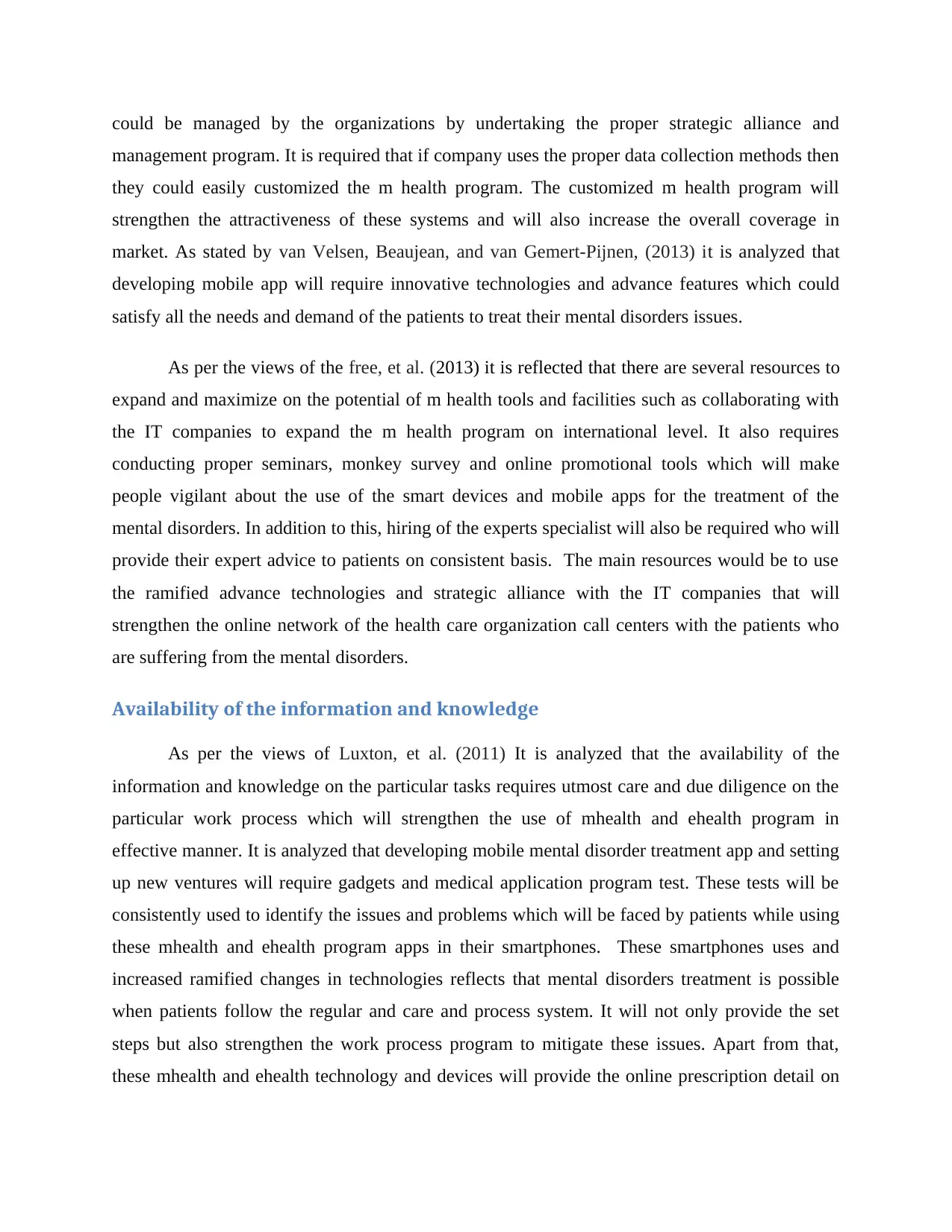
could be managed by the organizations by undertaking the proper strategic alliance and
management program. It is required that if company uses the proper data collection methods then
they could easily customized the m health program. The customized m health program will
strengthen the attractiveness of these systems and will also increase the overall coverage in
market. As stated by van Velsen, Beaujean, and van Gemert-Pijnen, (2013) it is analyzed that
developing mobile app will require innovative technologies and advance features which could
satisfy all the needs and demand of the patients to treat their mental disorders issues.
As per the views of the free, et al. (2013) it is reflected that there are several resources to
expand and maximize on the potential of m health tools and facilities such as collaborating with
the IT companies to expand the m health program on international level. It also requires
conducting proper seminars, monkey survey and online promotional tools which will make
people vigilant about the use of the smart devices and mobile apps for the treatment of the
mental disorders. In addition to this, hiring of the experts specialist will also be required who will
provide their expert advice to patients on consistent basis. The main resources would be to use
the ramified advance technologies and strategic alliance with the IT companies that will
strengthen the online network of the health care organization call centers with the patients who
are suffering from the mental disorders.
Availability of the information and knowledge
As per the views of Luxton, et al. (2011) It is analyzed that the availability of the
information and knowledge on the particular tasks requires utmost care and due diligence on the
particular work process which will strengthen the use of mhealth and ehealth program in
effective manner. It is analyzed that developing mobile mental disorder treatment app and setting
up new ventures will require gadgets and medical application program test. These tests will be
consistently used to identify the issues and problems which will be faced by patients while using
these mhealth and ehealth program apps in their smartphones. These smartphones uses and
increased ramified changes in technologies reflects that mental disorders treatment is possible
when patients follow the regular and care and process system. It will not only provide the set
steps but also strengthen the work process program to mitigate these issues. Apart from that,
these mhealth and ehealth technology and devices will provide the online prescription detail on
management program. It is required that if company uses the proper data collection methods then
they could easily customized the m health program. The customized m health program will
strengthen the attractiveness of these systems and will also increase the overall coverage in
market. As stated by van Velsen, Beaujean, and van Gemert-Pijnen, (2013) it is analyzed that
developing mobile app will require innovative technologies and advance features which could
satisfy all the needs and demand of the patients to treat their mental disorders issues.
As per the views of the free, et al. (2013) it is reflected that there are several resources to
expand and maximize on the potential of m health tools and facilities such as collaborating with
the IT companies to expand the m health program on international level. It also requires
conducting proper seminars, monkey survey and online promotional tools which will make
people vigilant about the use of the smart devices and mobile apps for the treatment of the
mental disorders. In addition to this, hiring of the experts specialist will also be required who will
provide their expert advice to patients on consistent basis. The main resources would be to use
the ramified advance technologies and strategic alliance with the IT companies that will
strengthen the online network of the health care organization call centers with the patients who
are suffering from the mental disorders.
Availability of the information and knowledge
As per the views of Luxton, et al. (2011) It is analyzed that the availability of the
information and knowledge on the particular tasks requires utmost care and due diligence on the
particular work process which will strengthen the use of mhealth and ehealth program in
effective manner. It is analyzed that developing mobile mental disorder treatment app and setting
up new ventures will require gadgets and medical application program test. These tests will be
consistently used to identify the issues and problems which will be faced by patients while using
these mhealth and ehealth program apps in their smartphones. These smartphones uses and
increased ramified changes in technologies reflects that mental disorders treatment is possible
when patients follow the regular and care and process system. It will not only provide the set
steps but also strengthen the work process program to mitigate these issues. Apart from that,
these mhealth and ehealth technology and devices will provide the online prescription detail on
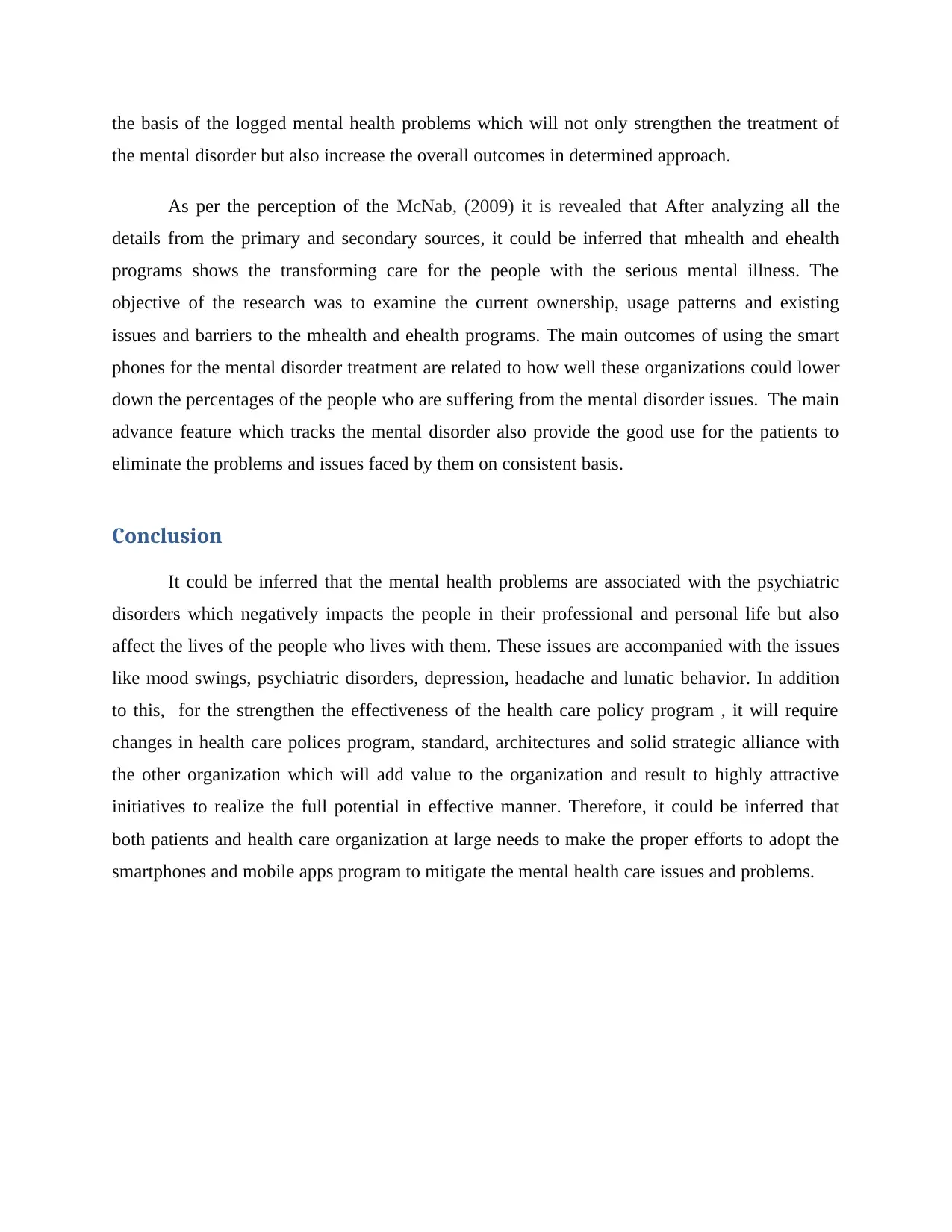
the basis of the logged mental health problems which will not only strengthen the treatment of
the mental disorder but also increase the overall outcomes in determined approach.
As per the perception of the McNab, (2009) it is revealed that After analyzing all the
details from the primary and secondary sources, it could be inferred that mhealth and ehealth
programs shows the transforming care for the people with the serious mental illness. The
objective of the research was to examine the current ownership, usage patterns and existing
issues and barriers to the mhealth and ehealth programs. The main outcomes of using the smart
phones for the mental disorder treatment are related to how well these organizations could lower
down the percentages of the people who are suffering from the mental disorder issues. The main
advance feature which tracks the mental disorder also provide the good use for the patients to
eliminate the problems and issues faced by them on consistent basis.
Conclusion
It could be inferred that the mental health problems are associated with the psychiatric
disorders which negatively impacts the people in their professional and personal life but also
affect the lives of the people who lives with them. These issues are accompanied with the issues
like mood swings, psychiatric disorders, depression, headache and lunatic behavior. In addition
to this, for the strengthen the effectiveness of the health care policy program , it will require
changes in health care polices program, standard, architectures and solid strategic alliance with
the other organization which will add value to the organization and result to highly attractive
initiatives to realize the full potential in effective manner. Therefore, it could be inferred that
both patients and health care organization at large needs to make the proper efforts to adopt the
smartphones and mobile apps program to mitigate the mental health care issues and problems.
the mental disorder but also increase the overall outcomes in determined approach.
As per the perception of the McNab, (2009) it is revealed that After analyzing all the
details from the primary and secondary sources, it could be inferred that mhealth and ehealth
programs shows the transforming care for the people with the serious mental illness. The
objective of the research was to examine the current ownership, usage patterns and existing
issues and barriers to the mhealth and ehealth programs. The main outcomes of using the smart
phones for the mental disorder treatment are related to how well these organizations could lower
down the percentages of the people who are suffering from the mental disorder issues. The main
advance feature which tracks the mental disorder also provide the good use for the patients to
eliminate the problems and issues faced by them on consistent basis.
Conclusion
It could be inferred that the mental health problems are associated with the psychiatric
disorders which negatively impacts the people in their professional and personal life but also
affect the lives of the people who lives with them. These issues are accompanied with the issues
like mood swings, psychiatric disorders, depression, headache and lunatic behavior. In addition
to this, for the strengthen the effectiveness of the health care policy program , it will require
changes in health care polices program, standard, architectures and solid strategic alliance with
the other organization which will add value to the organization and result to highly attractive
initiatives to realize the full potential in effective manner. Therefore, it could be inferred that
both patients and health care organization at large needs to make the proper efforts to adopt the
smartphones and mobile apps program to mitigate the mental health care issues and problems.
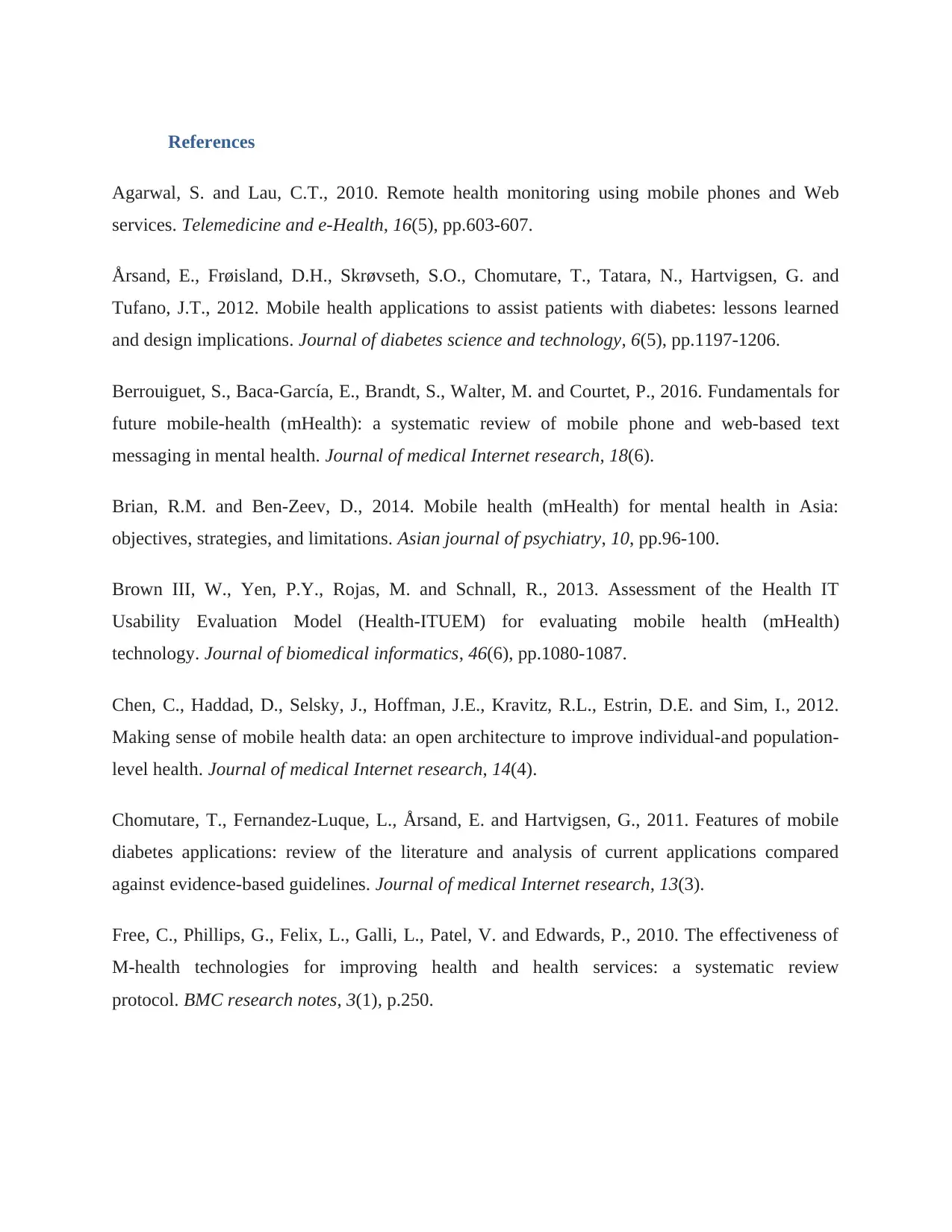
References
Agarwal, S. and Lau, C.T., 2010. Remote health monitoring using mobile phones and Web
services. Telemedicine and e-Health, 16(5), pp.603-607.
Årsand, E., Frøisland, D.H., Skrøvseth, S.O., Chomutare, T., Tatara, N., Hartvigsen, G. and
Tufano, J.T., 2012. Mobile health applications to assist patients with diabetes: lessons learned
and design implications. Journal of diabetes science and technology, 6(5), pp.1197-1206.
Berrouiguet, S., Baca-García, E., Brandt, S., Walter, M. and Courtet, P., 2016. Fundamentals for
future mobile-health (mHealth): a systematic review of mobile phone and web-based text
messaging in mental health. Journal of medical Internet research, 18(6).
Brian, R.M. and Ben-Zeev, D., 2014. Mobile health (mHealth) for mental health in Asia:
objectives, strategies, and limitations. Asian journal of psychiatry, 10, pp.96-100.
Brown III, W., Yen, P.Y., Rojas, M. and Schnall, R., 2013. Assessment of the Health IT
Usability Evaluation Model (Health-ITUEM) for evaluating mobile health (mHealth)
technology. Journal of biomedical informatics, 46(6), pp.1080-1087.
Chen, C., Haddad, D., Selsky, J., Hoffman, J.E., Kravitz, R.L., Estrin, D.E. and Sim, I., 2012.
Making sense of mobile health data: an open architecture to improve individual-and population-
level health. Journal of medical Internet research, 14(4).
Chomutare, T., Fernandez-Luque, L., Årsand, E. and Hartvigsen, G., 2011. Features of mobile
diabetes applications: review of the literature and analysis of current applications compared
against evidence-based guidelines. Journal of medical Internet research, 13(3).
Free, C., Phillips, G., Felix, L., Galli, L., Patel, V. and Edwards, P., 2010. The effectiveness of
M-health technologies for improving health and health services: a systematic review
protocol. BMC research notes, 3(1), p.250.
Agarwal, S. and Lau, C.T., 2010. Remote health monitoring using mobile phones and Web
services. Telemedicine and e-Health, 16(5), pp.603-607.
Årsand, E., Frøisland, D.H., Skrøvseth, S.O., Chomutare, T., Tatara, N., Hartvigsen, G. and
Tufano, J.T., 2012. Mobile health applications to assist patients with diabetes: lessons learned
and design implications. Journal of diabetes science and technology, 6(5), pp.1197-1206.
Berrouiguet, S., Baca-García, E., Brandt, S., Walter, M. and Courtet, P., 2016. Fundamentals for
future mobile-health (mHealth): a systematic review of mobile phone and web-based text
messaging in mental health. Journal of medical Internet research, 18(6).
Brian, R.M. and Ben-Zeev, D., 2014. Mobile health (mHealth) for mental health in Asia:
objectives, strategies, and limitations. Asian journal of psychiatry, 10, pp.96-100.
Brown III, W., Yen, P.Y., Rojas, M. and Schnall, R., 2013. Assessment of the Health IT
Usability Evaluation Model (Health-ITUEM) for evaluating mobile health (mHealth)
technology. Journal of biomedical informatics, 46(6), pp.1080-1087.
Chen, C., Haddad, D., Selsky, J., Hoffman, J.E., Kravitz, R.L., Estrin, D.E. and Sim, I., 2012.
Making sense of mobile health data: an open architecture to improve individual-and population-
level health. Journal of medical Internet research, 14(4).
Chomutare, T., Fernandez-Luque, L., Årsand, E. and Hartvigsen, G., 2011. Features of mobile
diabetes applications: review of the literature and analysis of current applications compared
against evidence-based guidelines. Journal of medical Internet research, 13(3).
Free, C., Phillips, G., Felix, L., Galli, L., Patel, V. and Edwards, P., 2010. The effectiveness of
M-health technologies for improving health and health services: a systematic review
protocol. BMC research notes, 3(1), p.250.
Paraphrase This Document
Need a fresh take? Get an instant paraphrase of this document with our AI Paraphraser
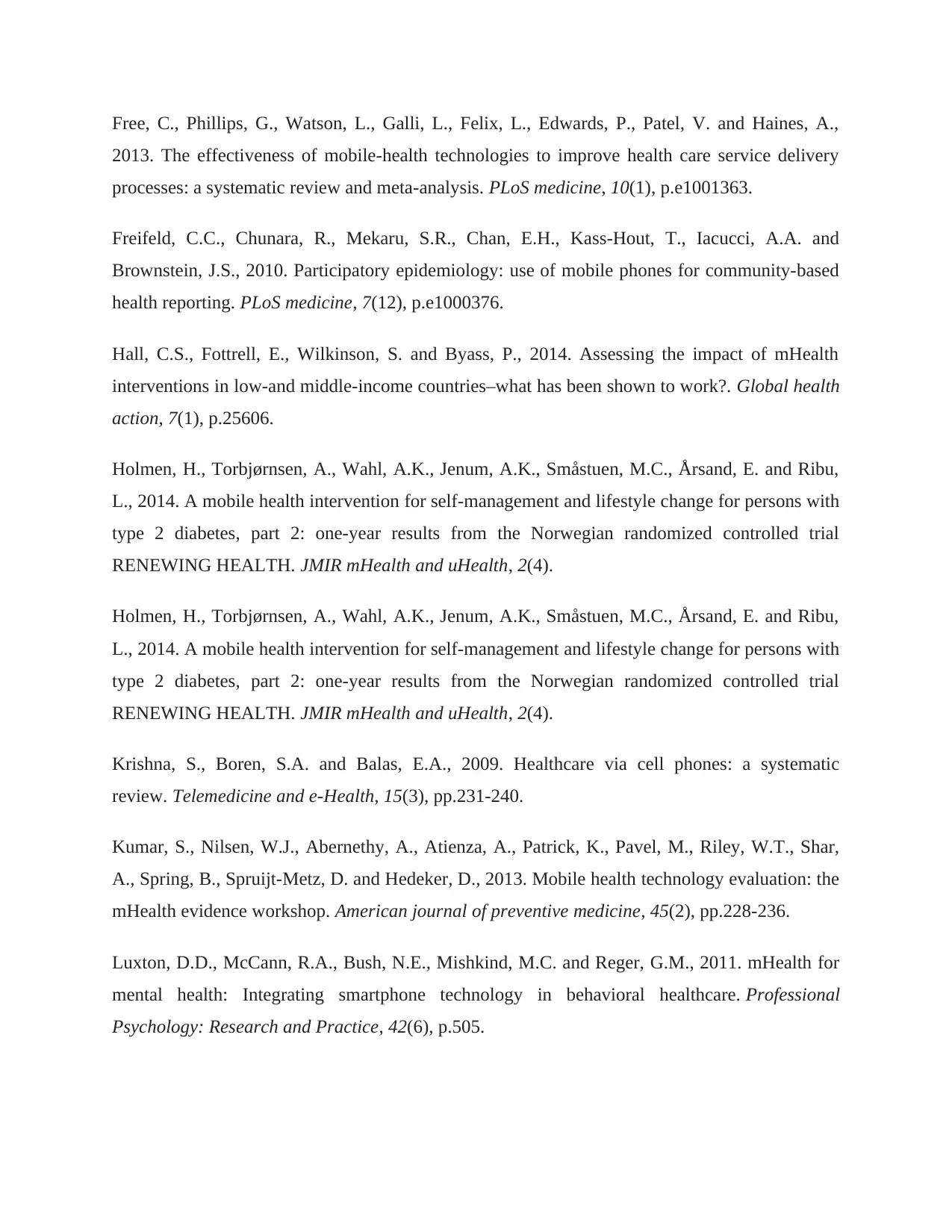
Free, C., Phillips, G., Watson, L., Galli, L., Felix, L., Edwards, P., Patel, V. and Haines, A.,
2013. The effectiveness of mobile-health technologies to improve health care service delivery
processes: a systematic review and meta-analysis. PLoS medicine, 10(1), p.e1001363.
Freifeld, C.C., Chunara, R., Mekaru, S.R., Chan, E.H., Kass-Hout, T., Iacucci, A.A. and
Brownstein, J.S., 2010. Participatory epidemiology: use of mobile phones for community-based
health reporting. PLoS medicine, 7(12), p.e1000376.
Hall, C.S., Fottrell, E., Wilkinson, S. and Byass, P., 2014. Assessing the impact of mHealth
interventions in low-and middle-income countries–what has been shown to work?. Global health
action, 7(1), p.25606.
Holmen, H., Torbjørnsen, A., Wahl, A.K., Jenum, A.K., Småstuen, M.C., Årsand, E. and Ribu,
L., 2014. A mobile health intervention for self-management and lifestyle change for persons with
type 2 diabetes, part 2: one-year results from the Norwegian randomized controlled trial
RENEWING HEALTH. JMIR mHealth and uHealth, 2(4).
Holmen, H., Torbjørnsen, A., Wahl, A.K., Jenum, A.K., Småstuen, M.C., Årsand, E. and Ribu,
L., 2014. A mobile health intervention for self-management and lifestyle change for persons with
type 2 diabetes, part 2: one-year results from the Norwegian randomized controlled trial
RENEWING HEALTH. JMIR mHealth and uHealth, 2(4).
Krishna, S., Boren, S.A. and Balas, E.A., 2009. Healthcare via cell phones: a systematic
review. Telemedicine and e-Health, 15(3), pp.231-240.
Kumar, S., Nilsen, W.J., Abernethy, A., Atienza, A., Patrick, K., Pavel, M., Riley, W.T., Shar,
A., Spring, B., Spruijt-Metz, D. and Hedeker, D., 2013. Mobile health technology evaluation: the
mHealth evidence workshop. American journal of preventive medicine, 45(2), pp.228-236.
Luxton, D.D., McCann, R.A., Bush, N.E., Mishkind, M.C. and Reger, G.M., 2011. mHealth for
mental health: Integrating smartphone technology in behavioral healthcare. Professional
Psychology: Research and Practice, 42(6), p.505.
2013. The effectiveness of mobile-health technologies to improve health care service delivery
processes: a systematic review and meta-analysis. PLoS medicine, 10(1), p.e1001363.
Freifeld, C.C., Chunara, R., Mekaru, S.R., Chan, E.H., Kass-Hout, T., Iacucci, A.A. and
Brownstein, J.S., 2010. Participatory epidemiology: use of mobile phones for community-based
health reporting. PLoS medicine, 7(12), p.e1000376.
Hall, C.S., Fottrell, E., Wilkinson, S. and Byass, P., 2014. Assessing the impact of mHealth
interventions in low-and middle-income countries–what has been shown to work?. Global health
action, 7(1), p.25606.
Holmen, H., Torbjørnsen, A., Wahl, A.K., Jenum, A.K., Småstuen, M.C., Årsand, E. and Ribu,
L., 2014. A mobile health intervention for self-management and lifestyle change for persons with
type 2 diabetes, part 2: one-year results from the Norwegian randomized controlled trial
RENEWING HEALTH. JMIR mHealth and uHealth, 2(4).
Holmen, H., Torbjørnsen, A., Wahl, A.K., Jenum, A.K., Småstuen, M.C., Årsand, E. and Ribu,
L., 2014. A mobile health intervention for self-management and lifestyle change for persons with
type 2 diabetes, part 2: one-year results from the Norwegian randomized controlled trial
RENEWING HEALTH. JMIR mHealth and uHealth, 2(4).
Krishna, S., Boren, S.A. and Balas, E.A., 2009. Healthcare via cell phones: a systematic
review. Telemedicine and e-Health, 15(3), pp.231-240.
Kumar, S., Nilsen, W.J., Abernethy, A., Atienza, A., Patrick, K., Pavel, M., Riley, W.T., Shar,
A., Spring, B., Spruijt-Metz, D. and Hedeker, D., 2013. Mobile health technology evaluation: the
mHealth evidence workshop. American journal of preventive medicine, 45(2), pp.228-236.
Luxton, D.D., McCann, R.A., Bush, N.E., Mishkind, M.C. and Reger, G.M., 2011. mHealth for
mental health: Integrating smartphone technology in behavioral healthcare. Professional
Psychology: Research and Practice, 42(6), p.505.
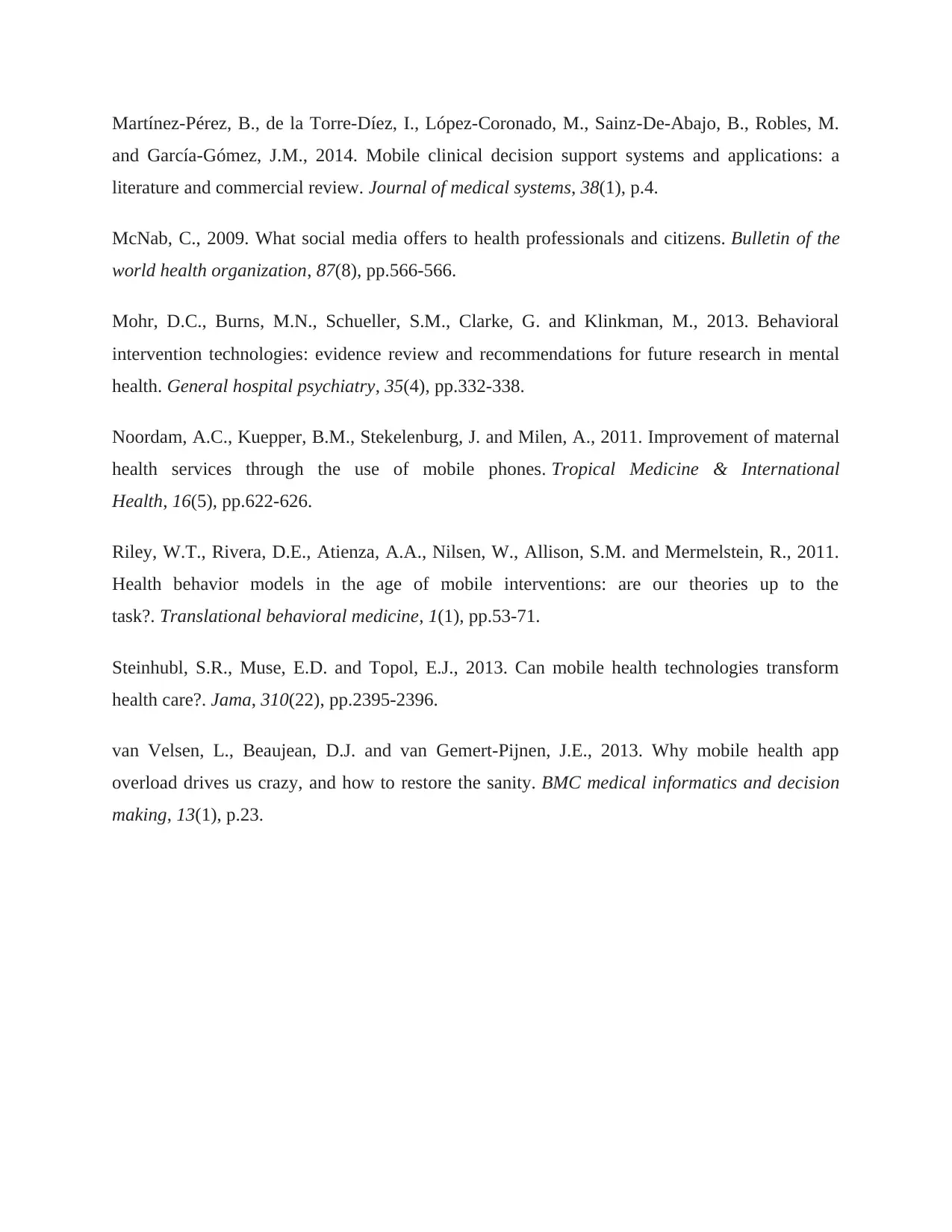
Martínez-Pérez, B., de la Torre-Díez, I., López-Coronado, M., Sainz-De-Abajo, B., Robles, M.
and García-Gómez, J.M., 2014. Mobile clinical decision support systems and applications: a
literature and commercial review. Journal of medical systems, 38(1), p.4.
McNab, C., 2009. What social media offers to health professionals and citizens. Bulletin of the
world health organization, 87(8), pp.566-566.
Mohr, D.C., Burns, M.N., Schueller, S.M., Clarke, G. and Klinkman, M., 2013. Behavioral
intervention technologies: evidence review and recommendations for future research in mental
health. General hospital psychiatry, 35(4), pp.332-338.
Noordam, A.C., Kuepper, B.M., Stekelenburg, J. and Milen, A., 2011. Improvement of maternal
health services through the use of mobile phones. Tropical Medicine & International
Health, 16(5), pp.622-626.
Riley, W.T., Rivera, D.E., Atienza, A.A., Nilsen, W., Allison, S.M. and Mermelstein, R., 2011.
Health behavior models in the age of mobile interventions: are our theories up to the
task?. Translational behavioral medicine, 1(1), pp.53-71.
Steinhubl, S.R., Muse, E.D. and Topol, E.J., 2013. Can mobile health technologies transform
health care?. Jama, 310(22), pp.2395-2396.
van Velsen, L., Beaujean, D.J. and van Gemert-Pijnen, J.E., 2013. Why mobile health app
overload drives us crazy, and how to restore the sanity. BMC medical informatics and decision
making, 13(1), p.23.
and García-Gómez, J.M., 2014. Mobile clinical decision support systems and applications: a
literature and commercial review. Journal of medical systems, 38(1), p.4.
McNab, C., 2009. What social media offers to health professionals and citizens. Bulletin of the
world health organization, 87(8), pp.566-566.
Mohr, D.C., Burns, M.N., Schueller, S.M., Clarke, G. and Klinkman, M., 2013. Behavioral
intervention technologies: evidence review and recommendations for future research in mental
health. General hospital psychiatry, 35(4), pp.332-338.
Noordam, A.C., Kuepper, B.M., Stekelenburg, J. and Milen, A., 2011. Improvement of maternal
health services through the use of mobile phones. Tropical Medicine & International
Health, 16(5), pp.622-626.
Riley, W.T., Rivera, D.E., Atienza, A.A., Nilsen, W., Allison, S.M. and Mermelstein, R., 2011.
Health behavior models in the age of mobile interventions: are our theories up to the
task?. Translational behavioral medicine, 1(1), pp.53-71.
Steinhubl, S.R., Muse, E.D. and Topol, E.J., 2013. Can mobile health technologies transform
health care?. Jama, 310(22), pp.2395-2396.
van Velsen, L., Beaujean, D.J. and van Gemert-Pijnen, J.E., 2013. Why mobile health app
overload drives us crazy, and how to restore the sanity. BMC medical informatics and decision
making, 13(1), p.23.
1 out of 15
Related Documents
Your All-in-One AI-Powered Toolkit for Academic Success.
+13062052269
info@desklib.com
Available 24*7 on WhatsApp / Email
![[object Object]](/_next/static/media/star-bottom.7253800d.svg)
Unlock your academic potential
© 2024 | Zucol Services PVT LTD | All rights reserved.





